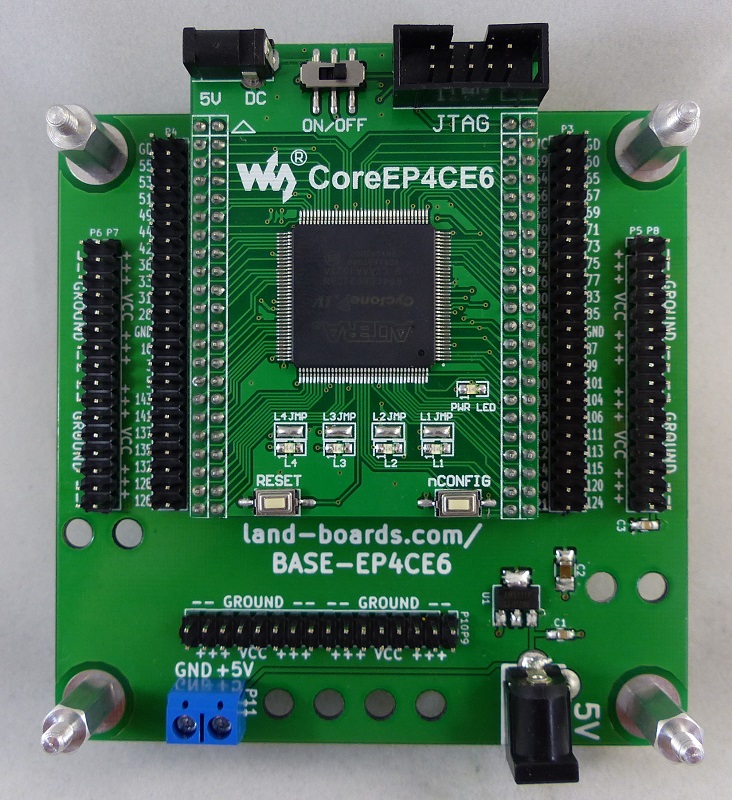

BASE-EP4CE6 Features
- WaveShare CoreEP4CE6 EP4CE6E22C8N FPGA Board
- Power LED
- (4) LEDs connected to I/O pins
- Config switch
- Reset switch
- Power Switch
- Power Switch does not turn board on/off when powered from this base board
- JTAG programming connnector
- Compatible with USB Blaster
- 5V power (or power through base board)
- Base board adds features
- Power Distribution
- GND/+3.3V on power strips
- All I/O pins brought out to header pins
- Allows easy connection for I/O cards
- Open Data Acquisition System compatible
- ODAS Form factor (95x95mm)
- 6-32 mounting holes in each corner
- Cable/zip ties hold down holes
Power domains
- 5V input through either the connectors on the base board or on the FPGA board
- Provides 5V to the CoreEP4CE6 board
- Only one source should be connected
- No protection if both are powered
- CoreEP4CE6 board creates 3.3V for its I/O pins
- 3.3V Power strips
- +3.3V Power Regulator on the base board powers the Power strips
- Use for powering external circuits
- Up to 1 Amp total
Indicators
- LED1 - LED4
- LED1 - JP0 removes - connects to IO3
- LED2 - JP2 removes - connects to IO7
- LED3 - JP3 removes - connects to IO10
- LED4 - JP4 removes - connects to IO11
- LED Select jumpers (solder bridges)
Connectors
- P3 and P4 marking is different on the Rev X1 board
- These are the actual pin numbers
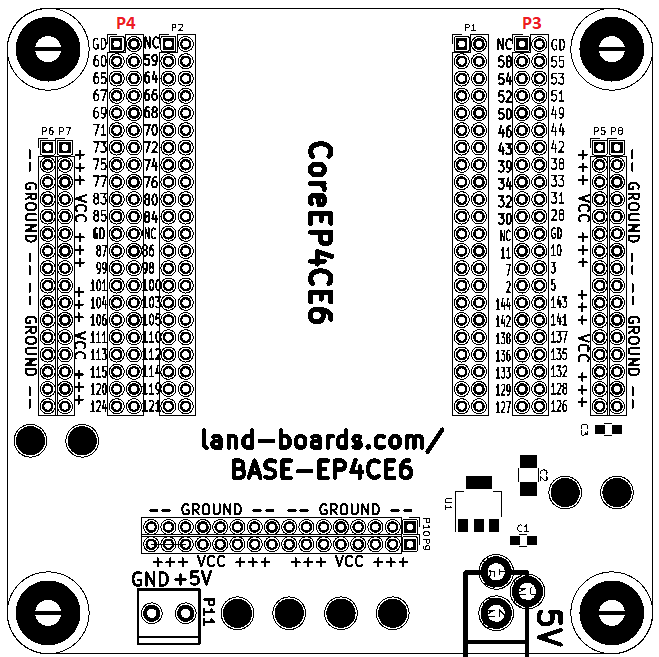
FPGA Board Pinout
- Pin numbers on the FPGA card are marked on the silkscreen on the bottom of the FPGA board
- Note that this is reflected when the card is installed onto the BASE board
- The base board also mirrors the adjacent pins
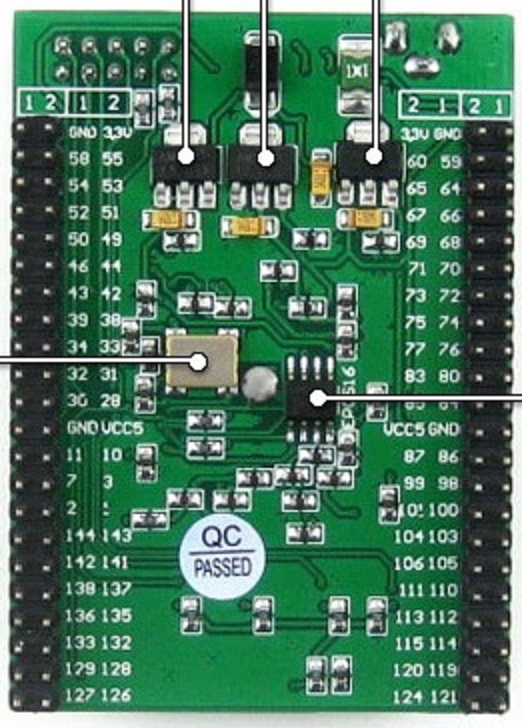
P1, P2 - FPGA Female connector
- Generally matches FPGA pinout
- Exceptions
- 3.3V from the FPGA card is not connected out of the FPGA card
- 3.3V power pins on the Base board are provided by the 3.3V regulator on the Base board
- Flipped from the FPGA pinout
- Note that the physical pins on the schematic are reversed from the pinout on the card
- Pin 1 from the FPGA is +3.3V
- Not connected on the header pins
- Base board is powered from the on-board 5V to 3.3V regulator
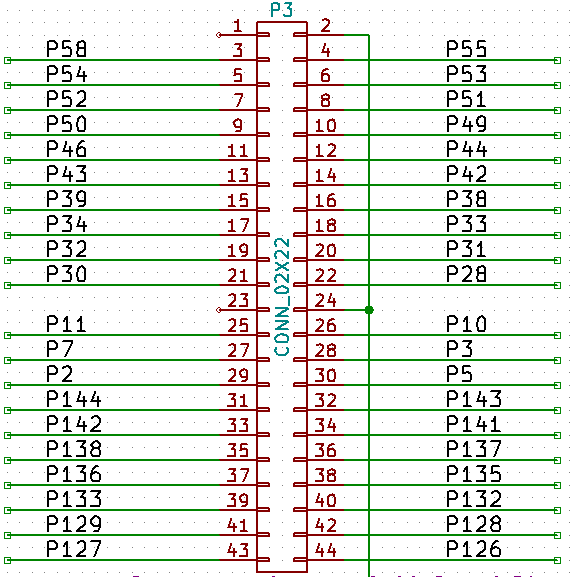
P3-Pin Port Pin P3-Pot
1 NC 2 GND
3 59 4 60
5 64 6 65
7 66 8 67
9 68 10 69
11 70 12 71
13 72 14 73
15 74 16 75
17 76 18 77
19 80 20 83
21 84 22 85
23 NC 24 GND
25 86 26 87
27 98 28 99
29 100 30 101
31 103 32 104
33 105 34 106
35 110 36 111
37 112 38 113
39 114 40 115
41 119 42 120
43 121 44 124
P4 - Male pins
- Flipped from the FPGA pinout
- Note that the physical pins on the schematic are reversed from the pinout on the card
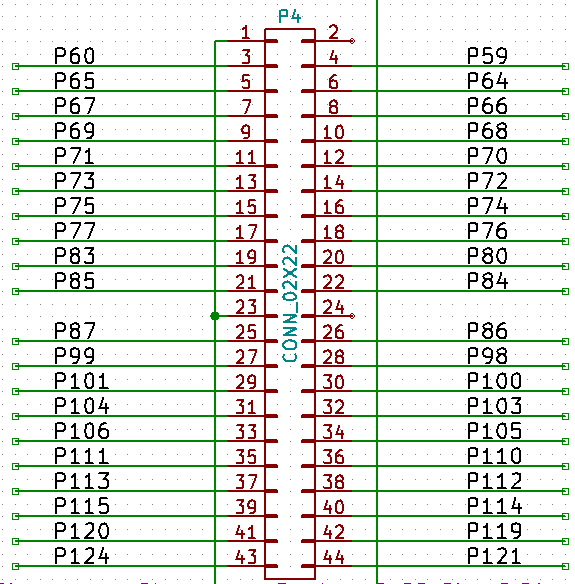
P4-Pin Port Pin P4-Port
1 GND 2 NC
3 55 4 58
5 53 6 54
7 51 8 52
9 49 10 50
11 44 12 46
13 42 14 43
15 38 16 39
17 33 18 34
19 31 20 32
21 28 22 30
23 GND 24 NC
25 10 26 11
27 3 28 7
29 5 30 2
31 143 32 144
33 141 34 142
35 137 36 138
37 135 38 136
39 132 40 133
41 128 42 129
43 126 44 127
P5-P10 Power Connector
- P5 = VCC
- P6 = GND
- P7 = VCC
- P8 = GND
- P9 = VCC
- P10 = GND
- Power/Grd pairs
- P6/P7 paired
- P5/P8 paired
- P9/P10 paired
P11 - 5V Terminal Block
- 5mm, 2-pin
- 5V and GND
- Connects directly to the 5V barrel connector
- Only connect one source of input power to the Base board
5V Barrel Connector
- 5V input power to the card
- 5V and GND
- Connects directly to the 5V terminal block
- Only connect one source of input power to the Base board
FPGA Board Physical
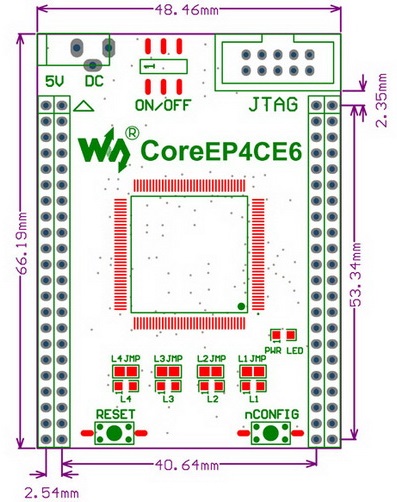
Retro-Computer (MultiComp) Map EP2 to EP4 card
- Map EP2 to EP4 card
- Maps EP4 I/O connections to the EP2 card used for MultiComp
Rev X2 Checkout
Rev X1 Checkout
- Connectors are swapped
- P3 and P4 Silkscreen is wrong
- Power is OK since the two connectors have the same pinouts for power
- Corrected silkscreen is as follows

Parts List/Assembly Sheet
CoreEP4CE6 PL and Assembly Sheet





